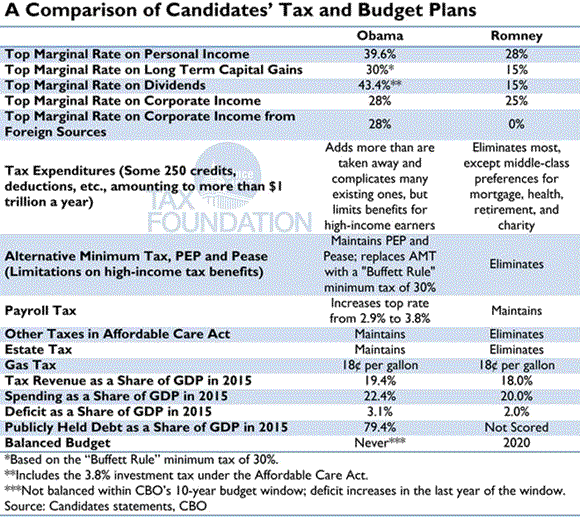This link will take you to a summary of the two presidential candidates’ taxation plans. We are also copying the summary and pasting it below. The website offers you more detail. Hat tip to Pete Speer for this link.
A Quick Guide to the Obama and Romney Tax Plans
October 18, 2012
By:
Nick Kasprak
William McBride

An additional tax issue involves the treatment of tax-free municipal bonds. Various proposals can alter this landscape, and all of them are subject to complex political outcomes. In its discussion of options, the Simpson-Bowles Commission used the repeal of the exclusion for interest on newly issued state and local government bonds.
According to the National Association of Bond Lawyers (September 2012) the Obama Administration “has proposed limiting the value of the exclusion, not only with respect to newly-issued bonds but also bonds that are currently outstanding and in the hands of investors.” Obama’s plan would essentially limit the value of a tax-free bond to that which is obtained if your federal tax bracket is 28%.
Under this mechanism the value of existing tax-free bonds would have to be adjusted for changes in the expected tax rates. The Bond Lawyers group estimates that a tax-free, 10-year, 5% bond that became fully taxable would experience a value change from $1000 par to $815. They are estimating the value of the implied tax benefit to derive this price.
Just limiting the tax benefit to the 28% bracket implies that a $1000-par-value bond would be marked down to $950. Of course, such estimates presume no other changes in the tax code and are based on assumptions. The Bond Lawyers also note that over 5 million households with incomes under $250,000 a year reported some tax-free income in the most recent year for which data is available (2009). Their point is that this type of tax change impacts many households and not just those whose incomes are over a quarter of a million annually.
We cannot determine how either candidate’s tax plans directly alter the tax-free bonds which are subject to the AMT. If Governor Romney’s repeal of AMT were to become a reality, the existing AMT bonds would likely remain tax-free.
Unlike President Obama, we cannot find any Romney proposal to restrict or eliminate the tax-free nature of municipal bonds. State and local governments are a fierce political opposition to changes which they perceive as increasing their cost of financing. They are correct.
One can determine this cost by looking at the difference in interest rates on taxable municipal bonds versus tax-free bonds of the same issuer. There is a significant difference. One can assume that the higher rates would become the norm in municipal finance if the tax-free status were to disappear.
At Cumberland, we do not believe the tax-free status of municipal debt will be repealed. Depending on the election outcome it may be limited in future years as the Obama Administration has proposed.
Taxes and tax policy are a huge issue in the coming election and in the budget and “fiscal cliff” negotiations. Many passionate views are being argued. Perhaps these numbers may be helpful.



So Obama ask’s the demographic with the majority of the wealth to pay more but Romney’s Plan of less tax revenue + less tax revenue = a balanced budget? Lol, I bet you believe you can have your cake and eat it too dont you? That when you build your company in America on the backs of Americans that you have no obligation to them… You patriot you….just like the republicans who value making Obama a one term president over any kind of assist for the millions of “kinda hads” or “have nots” who now have less.